Ecuador 9-V professional residency visa university list
Last activity 17 May 2017 by vsimple
12208 Views
37 replies
Subscribe to the topic
Post new topic
As of today at least, the link for the list of acceptable universities is a PDF file at:
http://www.educacionsuperior.gob.ec/wp- … 13-011.pdf
Just in case, the link is also available from this Facebook page:
facebook.com/permalink.php?id=154182398097351&story_fbid=205203996353338
Woo hoo! My colleges are on the list! Not sure why this would not be widely used because quite a few are on there.
I see that my degree from a private, Catholic university, St Catherine's University in St Paul, MN, is not on the list. If i have a certification to teach English as a second language, will I be able to work if I enter with a pensioner's visa?
DorothyPeck wrote:I see that my degree from a private, Catholic university, St Catherine's University in St Paul, MN, is not on the list. If i have a certification to teach English as a second language, will I be able to work if I enter with a pensioner's visa?
Yes!
Once you have a permanent-residency visa -- in your case, Dorothy, a pensioner visa -- you may obtain a cédula and will have the right to work in Ecuador.
As you may know, the cédula is an ID card with your unique Social Security-type number and photograph imprinted on it. Within several days of obtaining a residency visa, an Expat may obtain this important card as well.
cccmedia in Quito
SawMan wrote:Woo hoo! My colleges are on the list!
Simmer down there, vaquero.
The professional visa 9-V is not the answer to every Expat's prayers.
According to multiple Expat websites, this visa is specifically for professionals who intend to practice their professions in Ecuador.
For instance, the applicant must "fulfill the Ecuador requirements for such practice (e.g., bar exams etc.)" Source: yourescapetoecuador.com
An Expat wouldn't want to be in the position of declaring to the EC government that he or she is intending to practice a profession in Ecuador if the true intention is retirement.
On the other hand, if you truly do intend to resume your profession in La República and can pass the requisite Spanish-language "bar exams etc."...
...then this may be the gateway to your dreams 
cccmedia wrote:SawMan wrote:Woo hoo! My colleges are on the list!
Simmer down there, vaquero.The professional visa 9-V is not the answer to every Expat's prayers.
Totally being fecetious bro. I hardly expected a degree from a college on some list to mean automatic residency. It's just that the "working" part is so vague.
You've hit on the key to the Ecuadorian visa bureaucracy, SawMan.
Keep things vague, and that leaves plenty of room for "the boys" at the Cancillería to interpret the rules as they see fit.
cccmedia in Quito
if we have Associate's degree (2 years university degree) with certificate is acceptable؟
my university on list,how about my degree?
I think that only an Ecuadorian lawyer can answer this question. They know the Little things.
HelenPivoine
Thanks
cccMedia saysÑ An Expat wouldn't want to be in the position of declaring to the EC government that he or she is intending to practice a profession in Ecuador if the true intention is retirement.
cccMedia,
My Loja lawyer has assured me that if I get a Professional class visa I do not actually have to work.
HelenPivoine
Although I'm not an authority so I can't say conclusively, I dispute any linkage between obtaining a professional visa and an obligation to actually look for and/or engage in employment in EC. I've done fairly extensive research on the prof visa as I intend to apply at some point soon and I have found nothing to support this linkage in any of the EC gov't material posted online. Furthermore here is a blog post where the author describes in detail the process he went through to obtain a prof visa on his own:
http://siganomas.net/2015/04/how-to-get … ency-visa/
Note no mention whatsoever of a requirement to seek work in the field of study, no language test, nothing about a process to get any professional credentials recognized - nada in this regard, you get the visa and you are done with the process.
Here's another one, same thing:
http://cuencacultureshock.com/201302how … ador-html/
I know from other posts of hers that she works a bit in Cuenca as a salsa teacher and she has a graduate degree thus no link whatsoever between obtaining the prof visa and working in the field of study.
I had a cursory consultation with a lawyer in Cuenca, she outlined the basics, told me I qualified, and raised nothing about any plans to actually work.
So it seems pretty certain that prospective employment has no part in the application process - you register your qualifying degree, jump through various hoops and receive your visa. So once the visa is issued would the EC gov't have in place some kind of monitoring system to follow up with this category of foreign resident to prod them toward employment in the field of study? Doubtful in the extreme. Do they care what the foreign resident does after the resident visa is issued? Very unlikely as long as one is law abiding and self supporting. With my prof visa I intend to do little more than read books, cook, surf, volunteer a bit maybe and feed the local economy by spending 1200 bucks or so per month. I've come across no trace of any obligation or requirement whether explicit or implicit that would indicate anything wrong with what I plan to do.
Would be good though if a prof visa holder would post to confirm or correct.
Welcome to the Ecuador forum, Jer.
There could be a couple of blind spots in your reasoning.
The fact that a lawyer didn't mention a link between a professional-visa and seeking actual work .. that a poster who got the visa didn't say anything about a link .. and that you didn't see a seek-work requirement online .. doesn't mean there isn't a link or won't be one.
The Ecuadorian government and its bureaucrats are not bound by what may be missing from their departmental websites.
Here's an example... I went in to the Ecuadorian DMV last week to take an (off-road) exam to get a drivers license. My papers were in order and the exam was, I thought, the final step in a successful and lengthy process toward the license.
Only they didn't let me take the exam that day. Even though I am not 65+, the bureaucrat told me I needed to come back another day and get a medical review. A few days later, the medical reviewer told me my blood sugar results were too high to drive at night and I needed to get a specialist doctor's certificate.
How far do you think I'd have gotten if I said, "But there was nothing on your website or in my research about this certificate or other medical requirements!"
No, I had new blood testing done, then went to the doctor and got the certificate.
Government speaks. Expat jumps.
cccmedia in Quito
The other blind spot is the North American concept that a bureaucracy's past behavior is predictive of what a particular Expat will experience.
I suspect you are rational enough to acknowledge that a bureaucrat reviewing your application for a professional visa might ask, "Do you intend to seek work in Ecuador?"
Maybe they didn't used to ask that. But that was before the current budget crisis brought on by the devastating drop in oil prices. El Supremo has been doing anything he can to balance the budget, short of p***ing off the indigenous any further.
One phone call from him to his foreign-relations minister tomorrow could change everything....
Supremo: Hey, we need to get more Gringos investing in our economy. The ones who get around the pension and investment requirements with a professional visa ... from now on, get them to commit to seeking employment if they want the visa. Otherwise, they can put $25,000 into a CD. And we'll have them submit a detailed monthly report on their job-seeking efforts.
So then, Jer, how do you answer the ministry official who asks you, "Do you intend to seek work in Ecuador?"
Telling the truth -- that you don't plan on doing much besides read books, surf and maybe volunteer -- might not be a good-enough answer to get your visa ap approved.
cccmedia in Quito
Thanks CCCMedia, for the welcome and the feedback. You've outlined a number of ifs and coulds, hopefully someone will post something more tangible on this topic as I remain as skeptical as I was. An EC bureaucrat can ask whatever question they want of course but it is quite meaningless if there is no process to enforce it. They are clearly issuing visas based solely on the basis of a qualifying degree. Stop and think for a moment about the complexity of trying to coax someone, who already has the visa, into seeking employment and you'll realize it would be impossible in practice. And the benefit to the EC economy of forcing foreigners to compete with EC nationals in their labour market? Well, they'd certainly have to expand their bureaucracy!
I appreciate your engaging in the conversation, Jer, as this can be helpul to Expats deciding on their residency-visa strategy.
You're still thinking like a North American -- which, of course, is understandable.
To think as an Ecuadorian or, in this case, Ecuador's government: they would not expand the bureaucracy in this scenario.
They would just revoke your professional-visa rights and you would have to apply for some other visa, such as pensioner or investor, if you wanted to stay in the country long-term.
If you exited Ecuador without a replacement-visa, your professional visa could be officially canceled at the airport and you would be told you could not re-enter Ecuador for nine months.
cccmedia in Quito
Thanks CCC. I trust you are aware of the improbability of the scenario you outline; it just takes us further into the abstract realm of "could". Back to the tangible and what is really going on with the issue at hand: I had a message exchange with an expat who mentioned in a different thread that she had obtained a prof visa last year around this time. She reports an absolumente nada with respect to whether there is any kind of obligation to seek or accept employment. It wasn't raised at all neither during the application process nor afterward during the enjoyment of resident status. Wouldn't you think that she would've come across some indication if it were otherwise? She did mention that although she speaks Spanish, she doesn't have a level of fluency that would permit her to work in her field... but this has no bearing on her residency status as she has never had to take any Spanish language testing. So there you have, in addition to two bloggers that I referred to earlier, the real life experience of a prof visa holder as evidence that there is no kind of obligation to work. Maybe you could explain where you got the idea that there is such an obligation and if you could base it in something concrete rather than the conjecture that's been provided so far.
Actually, I have no hard evidence .. and don't dispute your position that up till now, there has been no evidence that the government has hassled Expats about seeking work.
My point was that things could change, as in the imagined scenario above between El Supremo and his minister.
I am not predicting that things will change on this score. However, I think that an Expat who has the option to seek a pensioner or investor visa might pursue those avenues .. rather than think that the 'professional' route will continue status quo given Ecuador's worsened economy.
cccmedia in Quito
I think CCC Media is offering you very good advice Ecuador is a 3rd world country. From the last time I followed developments in Ecuador things seemed to have changed more than 180 degrees...very radically...while discussions of politics are never a good idea I recommend that you use sources other than those who have obtained these visas more than a year ago. If you would like to send me a private message and enlighten you on some of these changes I have witnessed after more than three years following the Ecuador Forum I am more than willing to engage you. Many factors affect the visa process...economic ones particularly... it is not Canada. The Ecuadorian government is not at all like the Canadian government
Mr CCC media has been "on the ground" in Ecuador for many years. That is why he is honored with the title Ecuador Expert. He is very knowledgeable with regard to Ecuador's history, geography, economy, political system and as well the changes in visa processes over the years.. I am a US citizen..I have have never been there..but am knowledgeable about 3rd world countries in Africa and Asia and the little that I have learned following the developments in Central and South America
Political instability is almost a way of life in Ecuador, and that results in instability in many other areas, as each President has his own vision and his own ideas of what he wants to accomplish and how. This article from 2010 points out that in the preceding 13 years, Ecuador had 8 Presidents - each of whom was elected to a 4-year term but obviously you can't fit 8 4-year terms into 13 years...
http://www.telegraph.co.uk/news/worldne … years.html
Things can change, and sometimes quite drastically.
OsageArcher wrote:Political instability is almost a way of life in Ecuador... This article from 2010 points out that in the preceding 13 years, Ecuador had 8 Presidents - each of whom was elected to a 4-year term but obviously you can't fit 8 4-year terms into 13 years...
This presidency thing is taking us off-topic, but I want to correct the Telegraph article from 2010, which is inaccurate, although Brother Archer cited it as printed with no error on his part.
Ecuador has had five elected presidents since mid-1998. As of 2010, the publication date, it also had five since '98 since Rafael Correa has been president since 2007.
The incumbent has served continuously since January 2007 and when his current term expires in 2017 will have served a full ten years.
In 1997 there was an impeachment followed by a squabble over power. Fabián Alarcón moved up to interim president for two days, was replaced by a female temporary president for two days, and then Alarcón took over on an interim basis again until elections were held the following year.
Apparently, The Telegraph erroneously counted these brief/interim presidencies as being for four-year terms and counted Alarcón twice.
Source... Ecuador Heads of State page of Wikipedia.
cccmedia in Quito
I'd get up out of the weeds and ask myself if I truly thought Ecuador's intent in having a category of professional visa was to allow a bunch a non-practicing professionals residency in the country. Of course not. Somewhere along the line the people who did it had to lie. No thanks.
Thanks for the correction about the Presidency in Ecuador, sorry to get off-topic.
To get back on topic, although it may not be currently enforced, there is plenty of evidence that the Professional 9-V visa was at least intended for those who will exercise their profession in Ecuador, here from the Spanish Ecuador Expert on this blog, communicating to other Spanish speakers about the 9-V:
https://www.expat.com/forum/viewtopic.php?id=387167
'...con intensión de ejercer su profesión...'
Here from a .pdf of the law itself, LEY DE EXTRANJERIA, CODIFICACION.
Codificación 23, Registro Oficial 454 de 4 de Noviembre del 2004, talking of the 9-V:
'V.- Para ejercer una profesión liberal o una profesión técnica, con
arreglo a las normas de la Ley de Educación Superior.'
Similar wording is found in another official .pdf RESOLUCIÓN SADM 1920-2013-DR
Also here from an Ecuador law firm:
http://www.rap.com.ec/es/inicio/10-espa … visas.html
'9-V Para ejercer una profesión liberal o una profesión técnica.'
And here from another Ecuador law firm:
http://www.rpcabogados.com.ec/mate_extr … onte_a.htm
'9-V Aplicable a extranjeros que deseen ejercer una profesión liberal o técnica para lo cual deberán acreditar su título profesional.'
And here:
http://www.sempertegui.com/espanol/dere … torio.html
'Categoría 9-V Para profesionales que estudiaron en el Ecuador o que deseen venir a ejercer su profesión en este país.'
So while it may not be currently enforced it seems clear it is intended that the 9-V is for those who come to Ecuador to exercise their profession. That is what the law says, and that is what the understanding is of at least some Ecuadorian lawyers.
So no one is discounting real-life experience, just pointing out that what the law says, and what is enforced, are two different things. I would not assume that's never going to change.
I scanned through the list of countries and couldn't find the U.S. I know it is probably there and I just missed it somehow, but I can't seem to find it. Where on the list is our country? Thanks for your help.
Lines 582 - 828 list US universities, under "Estados Unidos".
I'm still confused a bit on the requirements for visiting, how long my family can visit, and the different ways one can apply for a residency Visa. I have a degree, but it is not a Masters. Is a Masters degree necessary to apply for the Professional Visa? Also, is it a requirement that I pursue work in my field and get a job there in order to stay? Given what I've read from other posters, jobs to foreigners are few and far between, and would go first to Ecuadorians or other South American citizens. I also have a secure income every month, but it is not a pension. Do you have to be retired and getting a pension in order to be approved? If I do not qualify for a permanent residency, what would you suggest are my options for being able to stay as long as possible each year?
This site, and the links included in the site, might be useful:
http://ecuador.org/nuevosite/serviciosc … isas_e.php
Diversity7 wrote:I'm still confused a bit on the requirements for visiting, how long my family can visit, and the different ways one can apply for a residency Visa. I have a degree, but it is not a Masters. Is a Masters degree necessary to apply for the Professional Visa? Also, is it a requirement that I pursue work in my field and get a job there in order to stay? Given what I've read from other posters, jobs to foreigners are few and far between, and would go first to Ecuadorians or other South American citizens. I also have a secure income every month, but it is not a pension. Do you have to be retired and getting a pension in order to be approved? If I do not qualify for a permanent residency, what would you suggest are my options for being able to stay as long as possible each year?
You could put $25,000 into an investment and get a perm Res visa that way
Diversity7 wrote:I'm still confused a bit on the requirements for visiting, how long my family can visit, and the different ways one can apply for a residency Visa. I have a degree, but it is not a Masters. Is a Masters degree necessary to apply for the Professional Visa?
Mugtech's suggestion works. Put at least $25,000 in an EC bank-or-institutional certificate of deposit plus $1,000 per dependent .. and you can qualify for a permanent immigrant visa. In this scenario, you do not have to secure employment, which as you mentioned gives preference to Ecuadorians.
As for visiting, folks from the U.S. and Canada and many other countries get a no-charge T-3 tourist stamp on arrival, good for 90 days in Ecuador .. during which time you can obtain a low-cost extension for up to 180 additional days.
After those 270 days you would need to exit Ecuador, but could do the same two-part process in succeeding years .. starting on the anniversary date of the first tourist stamp.
Other ways to stay in Ecuador for a year include volunteering for an approved non-profit organization ... or studying Spanish at an accredited school.
cccmedia in Quito
Diversity7 wrote:I also have a secure income every month, but it is not a pension. Do you have to be retired and getting a pension in order to be approved?
For the pensioner immigrant visa -- which is probably the most popular among North American Expats -- you do not have to be retired. There is no age limit.
Acceptable forms of income are pensions, annuities, structured settlements, disability income, Social Security and any other form of income that you or your attorney can get past the Ministry.
Rental-property income is not acceptable, as the occasional instances of vacancies and deadbeats make it less than truly dependable.
cccmedia in Quito
topumasum wrote:Why isn't UK in the list? 😐
It is on the list, under its Spanish name (of course).
Look under Reino Unido.
Kind of odd my College isn't on that list. Eastern Kentucky University is one of the top 5 universities in the U.S. for Police Sciences and top 10 for Criminal Justice degrees. I'm going to get my Master's Degree in Emergency Management, is that am important position in Ecuador? Or is it just one of those government positions they give to a friend as a way to help them out?
Emergency management is a big deal these days in Ecuador -- with communities devastated and threatened by volcanoes, floods and earthquakes in 2015 and/or 2016.
Presume that virtually all good jobs in that field go to Ecuadorians -- not foreigners -- who speak flawless Spanish and have the requisite education and training for the position.
The U.S. Embassy in Quito gave an emergency-preparedness seminar for Expats a while back, which I attended. After the ambassador said his opening remarks, the presenters were all Ecuadorians who knew their stuff. A Spanish-to-English translator was on hand .. and had plenty to do to keep up with the native-Spanish-speaking presenters.
cccmedia
Hi cccMedia,
I guess that I got in lucky, because I am retirement age and opted for the Professional visa as I was afraid that it would be too hard to prove my income and also it might not amount to $800 US, I am Canadian. I came prepared with proof of two degrees and a transcript of my M.A. degree work, already translated, and authenticated by DFAIT. There was no problem, they just put the first degree iinto the system. Later on I asked them to put the second degree into the system, just in case, so I am double proofed. I did not have to take any Spanish language or other exam for the visa. I got it a last March approximately,things may have changed.
HelenP
HelenPivoine wrote:Hi cccMedia,
I guess that I got in lucky, because I am retirement age and opted for the Professional visa as I was afraid that it would be too hard to prove my income...
Hi Helen...
Thanks for sharing this success story. It demonstrates that it may not be necessary to invest $25,000 or more in Ecuador CD's or real estate .. to qualify for a residency visa .. if you have a college or university degree.
Since your post is not about bringing kids to Ecuador, the stated topic of the thread where you originally posted, I have asked the home office to re-post it to the thread titled "Ecuador 9V Professional Residency Visa University List" in the Schools and Education section of the Ecuador forum.
cccmedia
Hello Everyone,
Please note that we have added the posts number 35 and 36 to this thread.
All the best,
Bhavna
HelenPivoine wrote:Hi cccMedia,
I guess that I got in lucky, because I am retirement age and opted for the Professional visa as I was afraid that it would be too hard to prove my income and also it might not amount to $800 US, I am Canadian. I came prepared with proof of two degrees and a transcript of my M.A. degree work, already translated, and authenticated by DFAIT. There was no problem, they just put the first degree iinto the system. Later on I asked them to put the second degree into the system, just in case, so I am double proofed. I did not have to take any Spanish language or other exam for the visa. I got it a last March approximately,things may have changed.
HelenP
You do know that the intent of the professional visa is to attract professionals to Ecuador. Especially professionals like doctors, certain engineers, educators, etc. If it gets exploited by people who use it for residency but in no way use it contribute in the manner that the visa was intended the loophole may eventually close when/if data from that specific type of visa is analyzed.
Articles to help you in your expat project in Ecuador
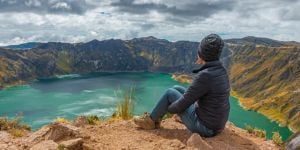 The Working Holiday Visa for Ecuador
The Working Holiday Visa for EcuadorEcuador is truly a paradise for adventure and nature lovers, and thanks to the Working Holiday Visa program, they ...
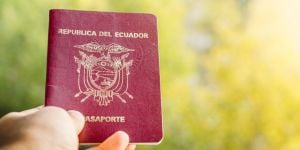 Permanent Residency in Ecuador
Permanent Residency in EcuadorEcuador is calling and you are ready to go and experience all that this gorgeous country has to offer. However, ...
 Getting Visas in Ecuador
Getting Visas in EcuadorFirst, do not be afraid of the Visas process. It is only a process of providing documents, getting them ...
 Resident Visas in Ecuador
Resident Visas in EcuadorRESIDENT VISAS IN ECUADOR - GENERAL INFORMATION
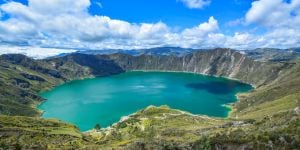 General visa requirements in Ecuador
General visa requirements in EcuadorEcuador's visa policy, one of the world's most lenient, makes it easy for tourists from almost all the countries ...
 Food in Ecuador
Food in EcuadorWhat kind of food will you find in restaurants, cafes, and private homes in Ecuador? Many restaurants in Ecuador ...
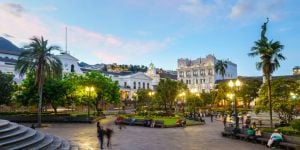 Work in Ecuador
Work in EcuadorEcuador is famous as a retirement haven. But you might not want to wait until retirement age to move there and ...
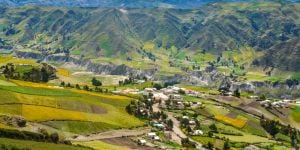 Family and children in Ecuador
Family and children in EcuadorFamily is everything to an Ecuadorian. The extended family unit is the most important aspect of life in Ecuador, ...
Find more topics on the Ecuador forum



